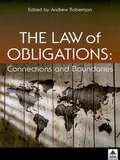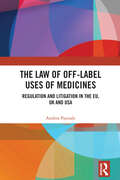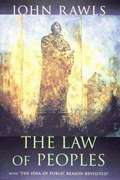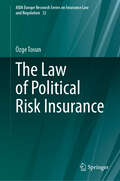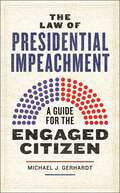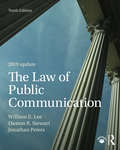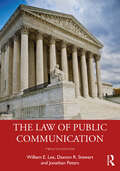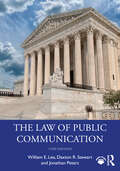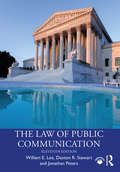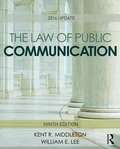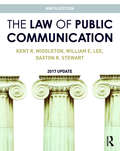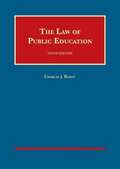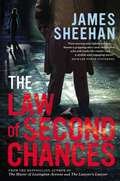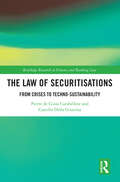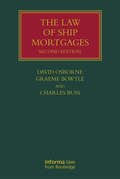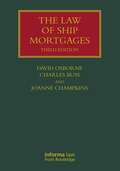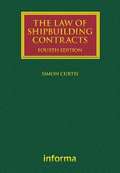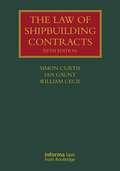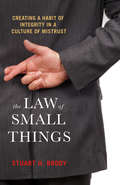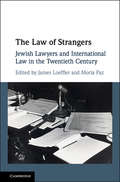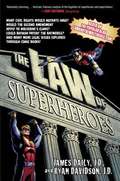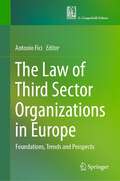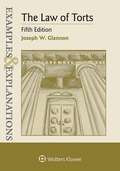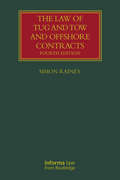- Table View
- List View
The Law of Obligations: Connections and Boundaries
by Andrew RobertsonThis collection of essays makes an important contribution to debate about the structure underlying private law and the relationships between its different branches. The contributors, including leading private law scholars from Australia, England and Canada, provide valuable insights by looking beyond the traditional categories and accepted structure of the law of obligations. This book covers three topics. The first is concerned with classification and the law of remedies. The chapters on this topic deal with both the classification of remedies themselves and with remedial issues that cross classificatory boundaries within the law of obligations. The chapters on the second topic reconsider some of the boundaries drawn by judges and scholars within the law of obligations. The third topic deals with the relationship between obligations and property. The chapters in this book offer illuminating new perspectives on fundamental issues in the law of obligations. Together, they provide a thought-provoking reconsideration of connections and boundaries in private law.
The Law of Off-label Uses of Medicines: Regulation and Litigation in the EU, UK and USA
by Andrea ParzialeThis book examines the regulatory framework for untested and unapproved uses (off-label uses) of medicines in the EU, UK, and USA. Before reaching patients, medicines are extensively tested by manufacturers and approved by regulators to minimise the risk of adverse reactions. However, physicians can prescribe pharmaceuticals for off-label uses, widespread in paediatrics, oncology, rare diseases and, more recently, in treatment for Covid-19. While off-label uses may offer hope, they may also expose patients to risks and uncertainties. Clarification is therefore needed to improve the protection of patients' rights while enhancing legal certainty for health actors. To this end, this work clarifies the regulatory mechanisms and litigation trends concerning off-licence prescriptions in these jurisdictions. It assesses how traditional, prevention-driven regulatory and civil liability rules are being adapted to tackle potential risks and scientific uncertainty. The book outlines the applicable regulations, as well as considering Brexit’s impact on off-label policies in the UK, and EU and national off-label policies in the context of the fight against the Covid-19 pandemic. It also explores under what conditions physicians, manufacturers, or regulators must compensate patients injured by untested prescriptions. The book will be an essential resource for researchers, academics and policy-makers working in the areas of medical law and ethics, public health law, pharmaceutical law and private comparative law.
The Law of Peoples
by John RawlsThis work consists of two parts: the essay The Idea of Public Reason Revisited, first published in 1997, and The Law of Peoples, a major reworking of a much shorter article by the same name published in 1993. Taken together, they are the culmination of more than 50 years of reflection on liberalism and on some of the most pressing problems of our times by John Rawls.
The Law of Political Risk Insurance (AIDA Europe Research Series on Insurance Law and Regulation #12)
by Özge TosunThis book explores the scope of host states’ sovereign powers and the rights of foreign investors. Investors from developed countries engage in business with developing countries for various purposes, including political reasons, expanding and diversifying their operations, accessing essential natural resources and skilled labor forces, lowering their production costs, and in some cases, even mitigating global warming. Correspondingly, in order to attract foreign investment, host countries can provide incentives or make concessions. However, once the investment has been made, these ventures are vulnerable to the actions of the host state. Political risk insurance, as the name suggests, serves to protect investments made in foreign countries where the sovereigns are more likely to interfere in the business activities of foreign investors. This book offers a comprehensive understanding of the general mechanics of each main type of political risk, the entities responsible for these risks, insurers, their unions, and the subrogation process. Bridging the fields of investment law, insurance law, and international law, it offers valuable insights from both practical and academic perspectives.
The Law of Presidential Impeachment: A Guide for the Engaged Citizen
by Michael J. GerhardtA clear and comprehensive overview of presidential impeachment from a leading expert in the fieldAs a result of Donald Trump’s presidency, impeachment was once again thrust into the spotlight of American political discussion. However, its history goes back to the very founding of the nation, when American colonists, remembering their grievances against their former king, entrenched the process in their new Constitution.The Law of Presidential Impeachment breaks down both the law and politics of this process, providing a comprehensive, nonpartisan, and up-to-date explanation of the Constitution’s various mechanisms for holding presidents accountable for their misdeeds. Based on a lifetime of scholarly research, as well as unique experience as a witness and consultant in the impeachment trials of Bill Clinton and Donald Trump, Michael J. Gerhardt’s new book takes the reader back to the basics of presidential impeachments. Rather than provide reasons for or against impeaching particular presidents, he explains the law and procedures that govern impeachment, examining a number of significant, yet under-explored, issues and themes. Gerhardt offers new perspectives on the subject, arguing that it cannot be properly understood in a vacuum, but must instead be viewed in the context of its coordination with such other mechanisms as criminal prosecutions, censure, elections, congressional oversight, and the Fourteenth and Twenty-Fifth Amendments.The Law of Presidential Impeachment will be an invaluable, accessible guide for future generations, giving them a succinct yet remarkably nuanced understanding of this core aspect of our executive branch and overarching governmental system.
The Law of Public Communication
by William E. Lee Kent R. Middleton Daxton R. StewartNow in its tenth edition, The Law of Public Communication provides an overview of media law that includes the most current legal developments. It explains the laws affecting the daily work of writers, broadcasters, PR practitioners, photographers, and other public communicators. By providing statutes and cases in an accessible manner, even to students studying law for the first time, the authors ensure that students will acquire a firm grasp of the legal issues affecting the media. This new edition features color photos, as well as breakout boxes that apply the book’s principles to daily life. The new case studies discussed often reflect new technologies and professional practices.
The Law of Public Communication
by William E. Lee Daxton R. Stewart Jonathan PetersThe twelfth edition of this classic textbook provides an overview of communication and media law including the most current legal developments. It explains laws affecting the daily work of writers, broadcasters, public relations practitioners, photographers, bloggers and other public communicators. By providing statutes and cases in an accessible manner, even to students studying law for the first time, the authors ensure that students acquire a firm grasp of the legal issues affecting the media. The book examines legal topics such as libel, privacy, intellectual property, obscenity and access to information, considering the development and current standing of relevant laws and important cases. It examines how these laws affect public, political and commercial communication. The twelfth edition discusses hot topics such as proposals to modify Section 230 of the Communications Decency Act, net neutrality legislation, participant monitoring, the "actual malice" standard for litigation against journalists and the Julian Assange Espionage Act prosecution. It also explores social media issues, such as whether social media use by public officials constitutes a public forum, liability for defamation and the operation of Facebook’s Oversight Board. The Law of Public Communication is an ideal core textbook for undergraduate and graduate courses in communication law and mass media law. Online resources include a test bank and PowerPoint slides.
The Law of Public Communication
by William E. Lee Daxton R. Stewart Jonathan PetersThis thoroughly updated classic textbook provides an overview of communication and media law, including the most current legal developments. It explains laws affecting the daily work of writers, broadcasters, public relations practitioners, photographers, bloggers and other public communicators.By outlining statutes and cases in an accessible manner, even to students studying law for the first time, the authors ensure that readers acquire a firm grasp of the legal issues affecting the media. The book examines legal topics such as libel, privacy, intellectual property, obscenity and access to information, considering the development and current standing of relevant laws and important cases. It examines how these laws affect public, political and commercial communication. The 13th edition covers contemporary U.S. Supreme Court cases, including the true threats case Counterman v. Colorado, the Andy Warhol fair use case and the Jack Daniel's trademark parody case. It also presents the Biden administration's revision of policy on the use of subpoenas and search warrants to uncover reporters' confidential sources along with the gag orders imposed by courts handling criminal and civil trials in which Donald Trump is a defendant. Further cases explored include the attacks by legislatures against the LGBTQ community, exemplified by a Tennessee law banning drag performances, and the emerging issues presented by artificial intelligence and the content moderation policies of social media platforms.The Law of Public Communication is an ideal core textbook for undergraduate and graduate courses in communication law and mass media law.A test bank for instructors is available at www.routledge.com/9781032676388
The Law of Public Communication, 11th Edition
by William E. Lee Daxton Stewart Jonathan PetersThe eleventh edition of this classic textbook provides an overview of communication and media law that includes the most current legal developments. It explains the laws affecting the daily work of writers, broadcasters, PR practitioners, photographers and other public communicators. By providing statutes and cases in an accessible manner, even to students studying law for the first time, the authors ensure that students will acquire a firm grasp of the legal issues affecting the media. This new edition features discussions of hot topics such as the prosecution of WikiLeaks founder Julian Assange for Espionage Act violations, the U.S. Supreme Court's decision in Iancu v. Brunetti addressing the registration of offensive trademarks, revenge porn, FTC guidelines on social media influencers and efforts by social media platforms to develop coherent approaches to misinformation. The Law of Public Communication is an ideal core textbook for undergraduate and graduate courses in communication law and mass media law. A downloadable test bank is available for instructors at www.routledge.com/9780367476793.
The Law of Public Communication: 2016 Update
by William E. Lee Daxton Stewart Kent R. MiddletonThe Law of Public Communication provides an overview of media law that includes the most current legal developments today. It explains the laws affecting the daily work of writers, broadcasters, advertisers, cable operators, Internet service providers, public relations practitioners, photographers, bloggers, and other public communicators. Authors Kent R. Middleton, William E. Lee, and Daxton R. Stewart take students through the basic legal principles and methods of analysis that allow students to study and keep abreast of the rapidly changing field of public communication. By providing statutes and cases in a cohesive manner that is understandable, even to students studying law for the first time, the authors ensure that students will acquire a firm grasp of the legal issues affecting the media. This 2017 Update brings the Ninth Edition up to date with the most recent cases and examples affecting media professionals and public communicators.
The Law of Public Communication: 2017 Update
by William E. Lee Daxton Stewart Kent R. MiddletonThe Law of Public Communication provides an overview of media law that includes the most current legal developments today. It explains the laws affecting the daily work of writers, broadcasters, advertisers, cable operators, Internet service providers, public relations practitioners, photographers, bloggers, and other public communicators. Authors Kent R. Middleton, William E. Lee, and Daxton R. Stewart take students through the basic legal principles and methods of analysis that allow students to study and keep abreast of the rapidly changing field of public communication. By providing statutes and cases in a cohesive manner that is understandable, even to students studying law for the first time, the authors ensure that students will acquire a firm grasp of the legal issues affecting the media. This 2017 Update brings the Ninth Edition up to date with the most recent cases and examples affecting media professionals and public communicators.
The Law of Public Education
by Charles J. RussoThe Tenth Edition of this textbook-casebook incorporates recent developments in K-12 Education Law into its conceptual framework by offering updated analysis of major topics in the field. The Tenth Edition added more than 500 case citations since 2014 along with substantive discussions of many of these suits. In addition, the book includes five new case excerpts of opinions on cutting edge issues addressing state aid to faith-based educational institutions in Chapter 2; whether communications by school board members via e-mail messages violate a state’s open meetings law in Chapter 4; the extent to which school boards may promote ballot initiatives in Chapter 4; transfer rules impacting student-athletes in interscholastic sports in Chapter 12; and the level of services school boards must provide students with disabilities in Chapter 15. Citations continue to include references to West’s Education Law Reporter, thereby making it easier for instructors, students, practitioners, and other readers to locate cases and materials.
The Law of Reputation and Brands in the Asia Pacific
by Megan Richardson Andrew T. Kenyon Ng-Loy Wee Loon Andrew T. Kenyon Ng-Loy Wee LoonEfforts to expand the scope of legal protection given to reputation and brands in the Asia Pacific region have led to considerable controversy. Written by a variety of experts, the essays in this book consider the developing law of reputation and brands in a fraught area.
The Law of Second Chances
by James SheehanJack Tobin, a Florida trial lawyer, is committed to justice for the innocent. But when he's presented with Henry Wilson's case, he's unsure of the convict's innocence. Wilson has eight weeks to live, and Tobin has to decide if he can and will help him.Benny Avrile is a small-time thief with his eye on an oil man's big billfold. But Benny is way over his head on this one. The robbery goes bad, and the oil man ends up dead. Just when Benny's fate is all but sealed, an old friend from Jack's past reaches out...The clock is ticking on Henry Wilson's life, the cops are in hot pursuit of Benny, and back at home, there are dark clouds on the horizon for Jack and his beautiful wife, Pat.
The Law of Securitisations: From Crisis to Techno-sustainability (Routledge Research in Finance and Banking Law)
by Pierre de Gioia Carabellese Camilla Della GiustinaThe book The Law of Securitisations: From Crises to Techno-sustainability provides a full and detailed account of the EU legislation in the area of structured finance with the new legal rules dissected and discussed in their full extent. Securitisation transactions have been identified in the literature among the main reasons for the 2007–2008 financial crisis, alongside derivative contracts. More than a decade later, the EU legislature passed in 2017 a legal framework comprehensively disciplining the area of securitisations in the EU. On such a background the main purpose of the book is to discuss and analyse, in a holistic way, both the rationale behind the securitisations as financial transactions and their main players (e.g. originators, SPVs and credit rating agencies) and their "ESG" challenges, particularly the recent regulation passed in the EU during the 2020–2021 global pandemic. The goal of this legal analysis is to identify and clarify the entire legal process of securitisations, as a result of the new EU legislation, as well as duties, responsibilities and practices incumbent on the main players. Furthermore, the monograph is also concerned with the new challenges facing financial markets and their regulation: the new concept of sustainability and the development of technology. In this scenario, there is a blend of financial issues, new environmental challenges and, ultimately, the role human beings are expected to play, also from a social justice perspective. Adopting not just doctrinal methodology but also comparative (from a private law perspective) and interdisciplinary (regulatory and law and economics), the authors also include a discussion of the main literature which has blossomed over the last two decades on structured finance transactions, particularly the literature that unveiled, a decade ago, the concept of shadow banking. This book will be one of the first to focus on the new EU Securitisation Regulation and will be of interest to academics, students and practitioners of financial law.
The Law of Ship Mortgages (Lloyd's Shipping Law Library)
by David Osborne Graeme Bowtle Charles BussThought to be the most comprehensive guide to English law relating to ship mortgages, the second edition of The Law of Ship Mortgages has been highly anticipated. This fully-updated and complete explanation provides practitioners with a practical, commercially-based, and definitive guide to the English law of ship mortgages as well as important related areas such as conflict of laws and insolvency. The authors, being seasoned practitioners themselves, bring their practical experience to bear on a number of difficult and developing areas of the law, such as: mortgagees’ duties, liability to charterers, conflicts of laws, work-outs and cross border insolvency. New to this edition: In-depth analysis of noteworthy cases such as The WD Fairway litigation, PK Airfinance v Alpstream, and Tropical Reefer and Anton Durbeck v DNB Enhanced coverage of issues such as security interests in ships, priority, and third party involvement Completely revised and reordered content, to better reflect practitioner needs Written with practitioners in mind, this new edition will be extremely useful to legal professionals working in any jurisdiction that is involved in international ship finance, as well as post-graduate students and academics.
The Law of Ship Mortgages (Lloyd's Shipping Law Library)
by David Osborne Charles Buss Joanne ChampkinsThis fully updated and comprehensive 3rd edition of The Law of Ship Mortgages provides readers with a practical, commercially based and definitive guide to the English law of ship mortgages. The authors, being seasoned practitioners, bring their extensive experience to bear on a number of difficult and developing areas of the law, such as: mortgagees’ duties, liability to charterers, the conflict of laws, work-outs, restructurings and cross-border insolvency.The 3rd edition includes new chapters on pre-delivery security, security over shares and on the increasingly important topic of ship leasing as a method of finance. It is written against the background of, and has regard to, ever-increasing sanctions affecting shipping and ship finance as well as the continued regulatory and industry-driven push towards reduction of emissions (IMO 2020 and IMO 2050).Written primarily with practitioners in mind, The Law of Ship Mortgages will continue to be extremely useful to legal professionals, especially in common law jurisdictions, involved in international ship finance or ship mortgage enforcement. It will also be a valuable resource for postgraduate students and academics, especially those with an interest in shipping law or the law of personal property more generally.
The Law of Shipbuilding Contracts (Lloyd's Shipping Law Library)
by Simon Curtis Ian GauntThis is the leading text on shipbuilding and marine construction, already widely used on a global basis by shipowners, shipbuilders and their commercial and legal advisers. It is now ten years since the last edition and much has changed in the world of shipbuilding since then, particularly in the period since 2008 which has seen numerous attempts by owners to renegotiate the prices and/or delivery dates of tonnage and an enormous increase in the level of “vessel rejection” and cancellation disputes. The Law of Shipbuilding Contracts examines the principles of English contract law as these apply to shipbuilding. This edition comments in detail upon the Shipbuilders’ Association of Japan Form but now contrasts this with the NEWBUILDCON from BIMCO in 2007 and the China Maritime Arbitration Commission Forms from 2011 where these are significantly different. It also includes sections dealing with agreements ancillary to the shipbuilding contract and conversion contracts. Overview of book: Since the last edition in 2002, China has become a major global exporter of newbuildings and new BIMCO shipbuilding contract form has been published. Although retaining the original format of commentary on the Japanese (SAJ) standard form shipbuilding contract, the new edition contrasts this with the BIMCO form and the recently published China Maritime Arbitration Commission (CMAC) form in order to provide a broad ranging analysis of this complex subject. The book details the principles of English contract law as these apply to international shipbuilding. It will, as in the previous editions, also include sections dealing with the guarantees and other agreements which support the shipbuilding contract and with ship conversion contracts Essential reading for: - Purchasers and charterers of newbuilding tonnage- Shipbuilders and offshore construction yards- Lawyers and insurers working in the maritime and offshore oil and gas sectors - Banks and other finance providers
The Law of Shipbuilding Contracts (Lloyd's Shipping Law Library)
by Simon Curtis Ian Gaunt William CecilThe Law of Shipbuilding Contracts examines the principles of English contract law as these apply to shipbuilding. The leading text on shipbuilding and marine construction, widely used by the global maritime community, this new edition is updated to account for the "long tail" effects of the global economic crisis on the sector. The authors provide expert analysis on the key shipbuilding contract forms, including sections dealing with agreements ancillary to the shipbuilding contract and ship conversion contracts, together with — for the first time — contracts for the construction of offshore oil and gas vessels and units. The new edition has been comprehensively updated, including commentary on recent High Court decisions on shipbuilding contracts and, in particular, associated refund guarantees. The contractual and legal consequences of global economic turbulence and the resultant increase in the number and size of disputes in the shipbuilding sector are discussed, alongside coverage of other contemporary regulatory and legal issues resulting from environmental pressures and the trend for "cleaner", more efficient tonnage. A comprehensive and authoritative resource, this book is essential reading for buyers and charterers of newbuilding tonnage, shipbuilders and offshore construction yards, shipbrokers, banks and other finance providers, lawyers and insurers working in the maritime and offshore oil and gas sectors, as well as students of maritime law.
The Law of Small Things: Creating a Habit of Integrity in a Culture of Mistrust
by Stuart H. BrodyWe are living in a time when dishonesty and duplicity are common in our public institutions, our workplaces, and even in our personal relationships. But by recognizing and resisting the small, seemingly inconsequential ways we make moral compromises in our own lives, we can repair the tear in our social and moral fabric.The Law of Small Things begins with an IQ (Integrity Quotient) test designed to reveal the casual way we regard our promises and the misconceptions we have about acting truthfully. The book shows how most people believe that integrity is something we "just have" and that we just do, like a Nike commercial. It depicts these and other deceptions we deploy to appear to act with integrity without actually doing so. The Law of Small Things also exposes how our culture encourages breaches of integrity through an array of "permitted promise-breaking," a language of clichés that equates self-interest with duty, and the "illusion of inconsequence" that excuses small breaches with the breezy confidence that we can fulfill integrity when it counts. Brody challenges the prevailing notion that integrity is a possession you hold permanently. No one "has integrity" and no one is perfect in practicing it. What we have is the opportunity to uphold promises and fulfill duties in each situation that faces us, large and small. Integrity is a practice and a habit of keeping promises, the ones we make explicitly and the ones that are implied in all our relationships. Ultimately, developing skill in the practice of integrity leads us to knowledge of who we are--not in the way the culture defines us, but in the way we truly know ourselves to be.
The Law of Strangers: Jewish Lawyers and International Law in the Twentieth Century
by James Loeffler Moria PazFrom the Nuremberg Trials to contemporary human rights, Jews have long played prominent roles in the making of international law. But the actual ties between Jewish heritage and legal thought remain a subject of mystery and conjecture even among specialists. This volume of biographical studies takes a unique interdisciplinary approach, pairing historians and legal scholars to explore how the Jewish identities and experiences shaped their legal thought and activism. Using newly-discovered sources and sophisticated interpretative methods, this book offers an alternative history of twentieth-century international legal profession - and a new model to the emerging field of international legal biography.
The Law of Superheroes
by Ryan Davidson James DailyAn intriguing and entertaining look at how America's legal system would work using the world of comic books. Two brave heroes take on the comic multiverse, wielding the greatest superpower of all: the law. James Daily and Ryan Davidson--attorneys by day, comic enthusiasts all of the time, and founders of the popular website lawandthemultiverse.com--have clearly found their vocation, exploring the hypothetical legal ramifications of comic book tropes, characters, and powers down to the most deliciously trivial detail. The Law of Superheroes asks and answers crucial speculative questions about everything from constitutional law and criminal procedure to taxation, intellectual property, and torts, including: Could Superman sue if someone exposed his true identity as Clark Kent? Are members of the Legion of Doom vulnerable to prosecution under RICO? Do the heirs of a superhero who comes back from the dead get to keep their inherited property after their loved one is resurrected? Does it constitute "cruel and unusual punishment" to sentence an immortal like Apocalypse to life in prison without the possibility of parole? Engaging, accessible, and delightfully educational, The Law of Superheroes is a must-have for legal experts, comic nerds, and anyone who will ever be called upon to practice law in the comic multiverse.
The Law of Third Sector Organizations in Europe: Foundations, Trends and Prospects
by Antonio FiciThis book presents and discusses the law of third sector organizations in a selected number of European Union countries and in a comparative perspective, with the aim of providing a common basis for further legal analyses or legislative advancements both at the national and supranational level. The book is divided into two parts. Chapters in Part I present the ways in which each national jurisdiction deals with the group of organizations identified by the authors as “third sector organizations”, regardless of the ways in which these organizations are denominated or are commonly known in each country or the place in which their regulation is found. Chapters in Part II share a synthesis and comparative approach and draw the lines for further developments of the research activity culminated in the book.
The Law of Torts: Examples and Explanations
by Joseph W. GlannonA favorite among successful students, and often recommended by professors, the unique Examples & Explanations series gives you extremely clear introductions to concepts followed by realistic examples that mirror those presented in the classroom throughout the semester. Use at the beginning and midway through the semester to deepen your understanding through clear explanations, corresponding hypothetical fact patterns, and analysis. Then use to study for finals by reviewing the hypotheticals as well as the structure and reasoning behind the accompanying analysis. Designed to complement your casebook, the trusted Examples & Explanations titles get right to the point in a conversational, often humorous style that helps you learn the material each step of the way and prepare for the exam at the end of the course. The unique, time-tested Examples & Explanations series is invaluable to teach yourself the subject from the first day of class until your last review before the final. Each guide: helps you learn new material by working through chapters that explain each topic in simple language challenges your understanding with hypotheticals similar to those presented in class provides valuable opportunity to study for the final by reviewing the hypotheticals as well as the structure and reasoning behind the corresponding analysis quickly gets to the point in conversational style laced with humor remains a favorite among law school students is often recommended by professors who encourage the use of study guides works with ALL the major casebooks, suits any class on a given topic provides an alternative perspective to help you understand your casebook and in-class lectures
The Law of Tug and Tow and Offshore Contracts (Lloyd's Shipping Law Library)
by Simon RaineyFully updated and revised to take into account the new BIMCO Supplytime 2017 contract with a detailed analysis of the changes since the Supplytime 2005 form and including a new analysis, for the first time, of the BIMCO Bargehire form, this is the only modern work on the law of towage and offshore vessel services. It gives a comprehensive and extensively researched account of the general law coupled with a detailed clause-by-clause commentary and analysis of all of the major standard contracts used in the international offshore, towage and heavylift sectors, comprising the BIMCO Towcon, Towhire, Supplytime and Heavylift forms, the full suite of BIMCO Wreck Removal forms and, now, also the BIMCO Bargehire form, as well as the ISU Salvcon and Salvhire forms. The Law of Tug and Tow and Offshore Contracts has rapidly established itself as a leading text and is written by, Simon Rainey QC, one of the foremost shipping practitioners with unrivalled experience in the field. Key reasons to buy The Law of Tug and Tow and Offshore Contracts, Fourth Edition • the only clause-by-clause commentary on all of the major standard form contracts used by the offshore industry • the only in-depth analysis of the drafting history of the BIMCO standard form offshore contracts, comparing the recent amended versions in their drafting context; • the only authoritative analysis of the case law and arbitration decisions affecting the towage and offshore industries • written from the perspective of a leading practitioner with unrivalled practical experience over many years of the contract forms and of the issues which arise under them (many of which are unreported) and involved in almost all of the leading cases and arbitrations in the field • written with an eye on the practicalities of how the contracts work given the everyday problems which arise in the industry, with guidance where the standard forms may require amendment
